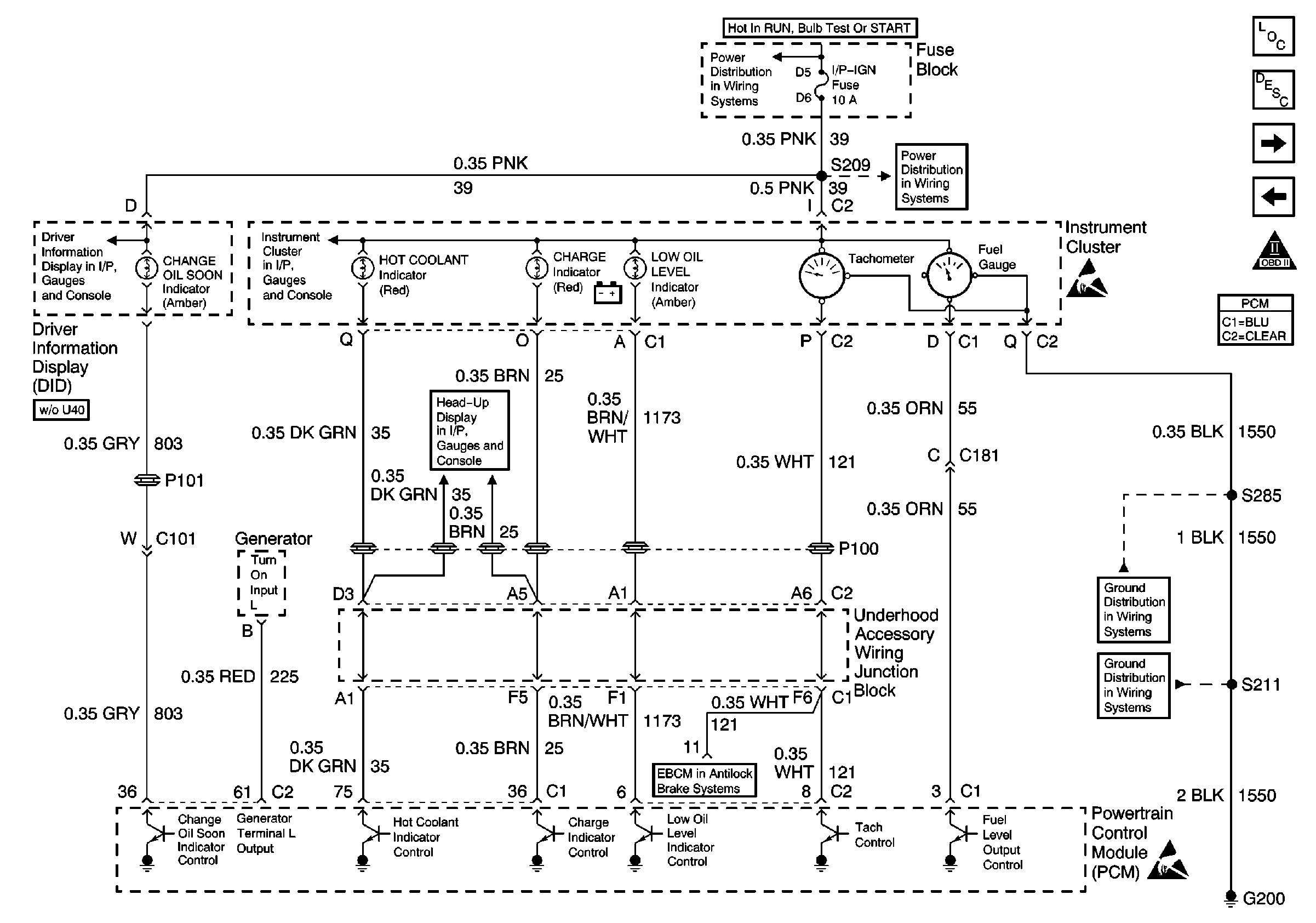Refer to Engine Controls Schematics
I/P and Driver Information Display

.
Circuit Description
The powertrain control module (PCM) uses the output driver modules (ODMs) in order to turn on many of the current-driven devices that are needed to control various engine and transaxle functions. Each ODM is capable of controlling up to 7 separate outputs by applying ground to the device which the PCM is commanding ON. Unlike the Quad Driver Modules (QDMs) used in prior model years, ODMs have the capability of diagnosing each output circuit individually. If there is an improper voltage level on the output circuit that controls the fuel gauge, DTC P0656 will set.
Conditions for Setting the DTC
| • | The ignition is ON. |
| • | An improper voltage level has been detected on the output circuit which controls the fuel gauge. |
| • | The above conditions are present for at least 30 seconds. |
Action Taken When the DTC Sets
The PCM stores conditions which were present when the DTC set as Failure Records only. This information will not be stored as Freeze Frame Records.
Conditions for Clearing the MIL/DTC
| • | The DTC becomes history when the conditions for setting the DTC are no longer present. |
| • | The history DTC clears after 40 malfunction free warm-up cycles. |
| • | The PCM receives a clear code command from the scan tool. |
Diagnostic Aids
Inspect for the following conditions.
Many situations may lead to an intermittent condition. Perform each inspection or test as directed.
Important: : Remove any debris from the connector surfaces before servicing a component. Inspect the connector gaskets when diagnosing or replacing a component. Ensure that the gaskets are installed correctly. The gaskets prevent contaminate intrusion.
| • | Loose terminal connection |
| - | Use a corresponding mating terminal to test for proper tension. Refer to Testing for Intermittent Conditions and Poor Connections , and to Connector Repairs in Wiring Systems for diagnosis and repair. |
| - | Inspect the harness connectors for backed out terminals, improper mating, broken locks, improperly formed or damaged terminals, and faulty terminal to wire connection. Refer to Testing for Intermittent Conditions and Poor Connections , and to Connector Repairs in Wiring Systems for diagnosis and repair. |
| • | Damaged harness--Inspect the wiring harness for damage. If the harness inspection does not reveal a problem, observe the display on the scan tool while moving connectors and wiring harnesses related to the sensor. A change in the scan tool display may indicate the location of the fault. Refer to Wiring Repairs in Wiring Systems for diagnosis and repair. |
| • | Inspect the powertrain control module (PCM) and the engine grounds for clean and secure connections. Refer to Wiring Repairs in Wiring Systems for diagnosis and repair. |
If the condition is determined to be intermittent, reviewing the Snapshot or Freeze Frame/Failure Records may be useful in determining when the DTC or condition was identified.
Test Description
The numbers below refer to the step numbers on the Diagnostic Chart.
-
Normally, ignition feed voltage should be present on the output control circuit with the PCM disconnected, with the ignition turned ON, and with the engine OFF.
-
This step tests for a shorted component or for a short to B+ on the output control circuit. Either condition will result in a measured current of more than 1.5 amps. This step also tests for a component that is going open while being operated, resulting in a measured current of 0 amps.
-
This step tests for a malfunctioning instrument cluster.
-
This vehicle is equipped with a PCM which utilizes an electrically erasable programmable read-only memory (EEPROM). When you replace the PCM, you must program the new PCM.
Step | Action | Value(s) | Yes | No |
|---|---|---|---|---|
1 | Did you perform the Powertrain On Board Diagnostic (OBD) System Check? | -- | ||
2 | Did you perform the Instrument Cluster System Check in Electrical Diagnosis? | -- | Go to Instrument Cluster System Check in Instrument Panel, Gauges & Console | |
Is the voltage near the specified value? | B+ | |||
Is the current between the specified values? | 0.1 Amp-1.5 Amps | |||
Is the voltage at the specified value? | 0V | |||
6 | Locate and repair the short to voltage in the affected PCM output circuit. Refer to Wiring Repairs in Wiring Systems. Did you complete the repair? | -- | -- | |
7 | Inspect the ignition supply fuse for the instrument panel cluster. Is the fuse open? | -- | ||
8 |
Did you complete the repair? | -- | -- | |
9 |
Is the voltage near the specified value? | B+ | ||
10 |
Did you find and correct the condition? | -- | ||
11 |
Did you find and correct the condition? | -- | ||
12 |
Does the fuel gauge indicate EMPTY? | -- | Go to Diagnostic Aids | |
13 |
Did you find and correct the condition? | -- | ||
14 | Locate and repair the open in the ignition feed circuit to the instrument panel cluster indicator lamps. Refer to Wiring Repairs in Wiring Systems. Did you find and correct the condition? | -- | -- | |
15 | Replace the instrument panel cluster. Refer to Instrument Cluster Replacement in Instrument Panel, Console and Gauges. Did you complete the replacement? | -- | -- | |
|
Important: The replacement PCM must be programmed. Refer to Powertrain Control Module Replacement/Programming . Replace the PCM. Did you complete the replacement? | -- | -- | ||
17 | Operate the vehicle within the conditions necessary for setting this DTC. Does P0656 reset? | -- | System OK |
